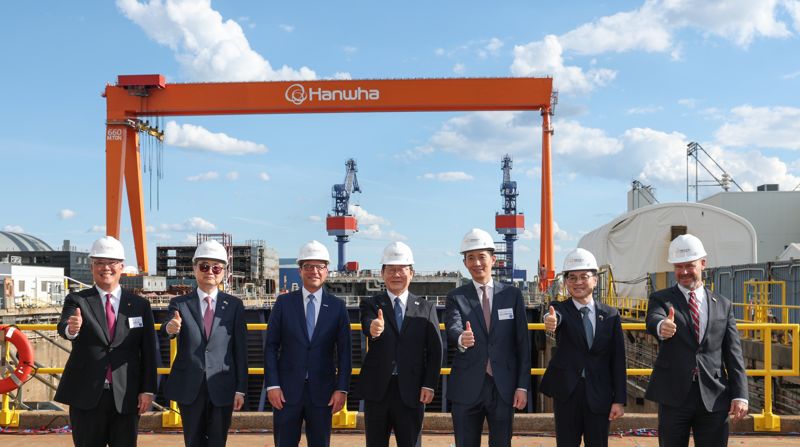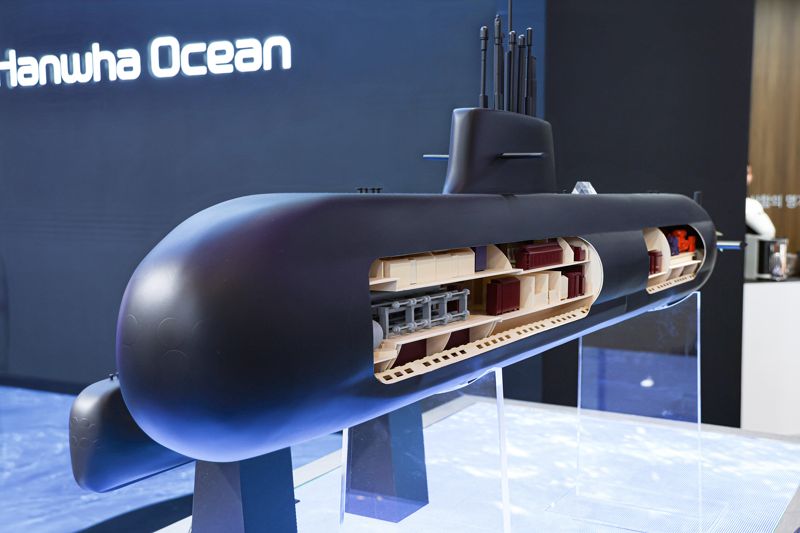Trump’s ‘Korean Nuclear Submarine’ Partner Is Hanwha... Expectations Rise for Expanded MASGA Orders
- Input
- 2025-10-30 15:37:00
- Updated
- 2025-10-30 15:37:00

[Financial News] With US President Donald Trump approving the construction of nuclear-powered submarines in Korea, expectations are rising for Hanwha Group’s Make American Shipbuilding Great Again (MASGA) project to secure more orders. Initially, Philly Shipyard, acquired by Hanwha Group, was expected to focus on building logistics support vessels for the United States Navy (USN). However, President Trump has designated the shipyard as a base for constructing nuclear submarines, raising prospects for increased defense contracts. While experts welcome the expansion of MASGA cooperation, they also point out that licensing issues, diplomatic relations with China, and additional US investment remain challenges.
Expansion from commercial vessels to special-purpose shipbuilding
On the 29th (local time), President Trump announced via his social media platform Truth Social that he had approved the construction of nuclear-powered submarines in Korea. This was in response to President Lee Jae Myung’s request at the previous day’s summit to "make a decisive move to allow Korea to receive fuel for nuclear-powered submarines." The nuclear-powered submarines mentioned by President Lee refer to SSNs (nuclear-powered attack submarines), which do not carry nuclear weapons, rather than SSBNs (strategic nuclear submarines) that are equipped with nuclear arms.A Hanwha Group representative stated, "We support the crucial and significant decisions made by President Lee Jae Myung and President Trump, and will actively cooperate with both governments." The spokesperson added, "Hanwha Group is prepared to provide advanced shipbuilding technology. Investments and partnerships through Philly Shipyard will contribute to the prosperity and joint security of both nations."
Experts believe that President Trump’s approval for Korea to build nuclear-powered submarines will not only strengthen national security but also further solidify the US-Korea shipbuilding cooperation project, MASGA.
Jang Won-jun, Professor at Jeonbuk National University (JBNU) Department of Advanced Defense Industry, described it as "a monumental milestone opening a new chapter in US-Korea defense cooperation." He analyzed, "Korea is moving beyond being a simple arms purchaser from the US to jointly developing, producing, and building defense assets, and even sharing the defense supply chain and ecosystem between the two countries—marking the beginning of third-generation defense cooperation." He added, "In particular, joint construction of nuclear-powered submarines at Philly Shipyard symbolizes Korea’s entry into the global defense supply chain and is expected to greatly enhance the future security capabilities of the Republic of Korea, beyond just strategic naval autonomy."
Expectations for Hanwha Group are especially high. Philly Shipyard, acquired by Hanwha Group, has emerged as the symbol of the MASGA project. During a special speech at the Asia-Pacific Economic Cooperation (APEC) CEO Summit held at Gyeongju Arts Center on the 29th, President Trump remarked, "There is someone who acquired Philly Shipyard (Hanwha Group), and it will become the most successful shipyard in the world." He also selected Philly Shipyard as the site for building nuclear-powered submarines.
Experts predict that constructing nuclear-powered submarines at Philly Shipyard will lead to expanded MASGA orders. Eunchang Lee, a research fellow at the Korea Institute for Industrial Economics & Trade (KIET), explained, "Building nuclear-powered submarines means that special-purpose defense vessels will be constructed in the US." He continued, "Philly Shipyard has mainly built commercial vessels, so MASGA cooperation was expected to focus on logistics support vessels for the USN, but now the range of vessel types can be expanded."

Exports also gain momentum... Licensing and China remain obstacles
Hanwha Ocean’s submarines are also expected to see a positive impact on global exports. Currently, Hanwha Ocean has secured orders for a total of 23 submarines worldwide: nine Jang Bogo-class submarines (KSS-I), three Jang Bogo-II-class submarines, two Dosan Ahn Changho-class Batch-I submarines, three KSS-III Batch-II submarines, and six Indonesian Export Submarines. Of these, 17 have been delivered and six are under construction. Recently, Hanwha Ocean has been competing with leading European nuclear submarine manufacturers for large submarine projects in Canada and Poland. Eunchang Lee noted, "Nuclear-powered submarines are considered the ultimate submarines due to their unrivaled underwater endurance." He added, "If Korea can build nuclear-powered submarines with its own technology, it will have the technological competitiveness of a country possessing all submarine technologies."However, licensing issues, diplomatic relations with China, and additional US investment could pose obstacles. While the US-Korea alliance will be strengthened, the move is also aimed at checking China, which could lead to deteriorating relations with Beijing. Recently, China placed five US subsidiaries of Hanwha Ocean on its restricted transaction list, openly challenging the US-Korea shipbuilding partnership.
An industry official commented, "To build nuclear-powered submarines at Philly Shipyard, Hanwha Group will need defense-related licenses, but it is still unclear whether a US or Korean license will be required." The official added, "Especially, additional investment in the US is inevitable for submarine construction, raising concerns about further deterioration in relations with China."
Professor Jang also advised, "There are still medium- to long-term challenges to be addressed before actual construction, such as technology transfer, nuclear fuel supply and non-proliferation issues, amendments to US ship-related laws, and the signing of a Reciprocal Defense Procurement Agreement (RDP-A) between the US and Korea. Close cooperation between the two countries must continue."
hoya0222@fnnews.com Kim Dong-ho Reporter